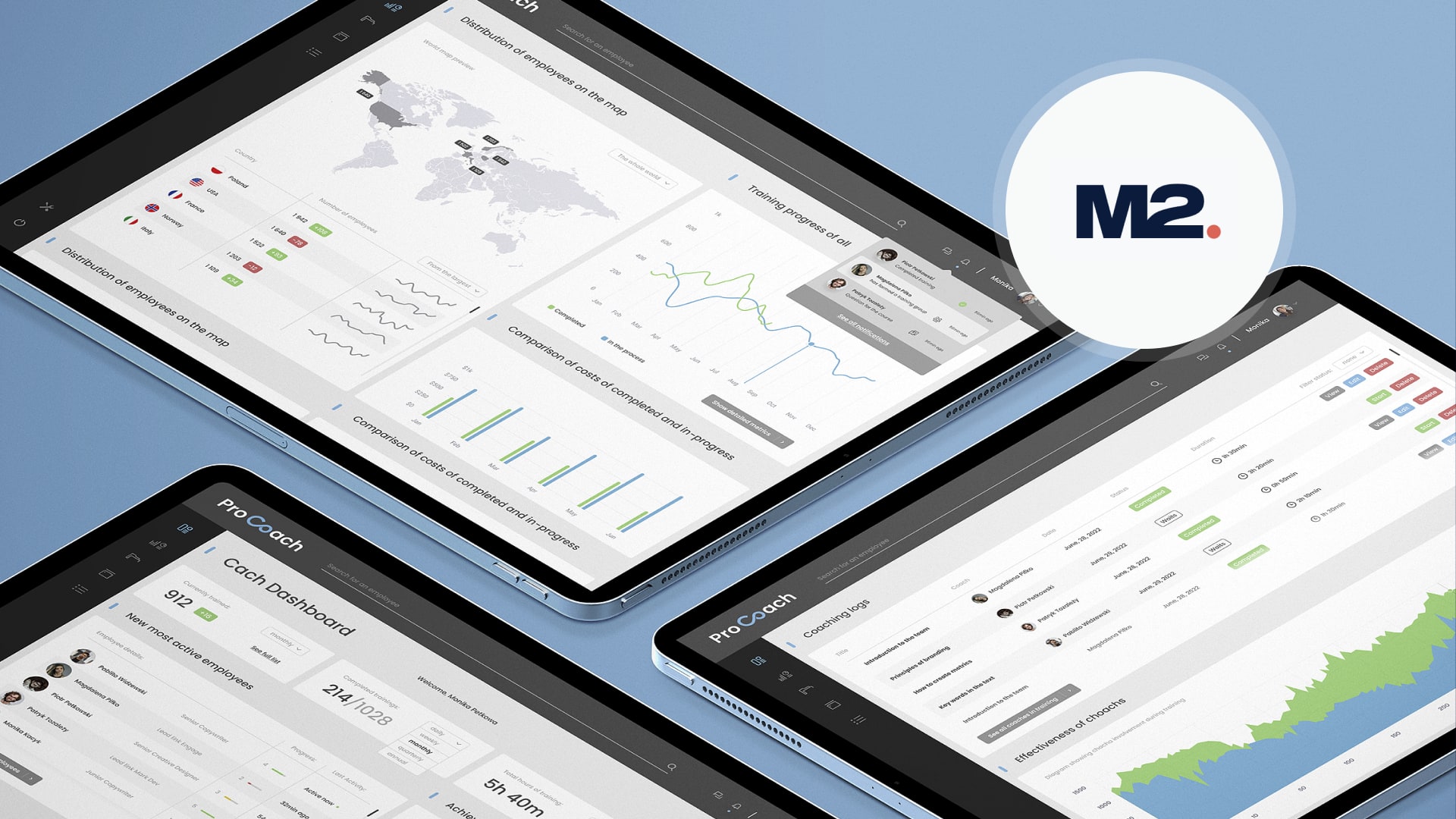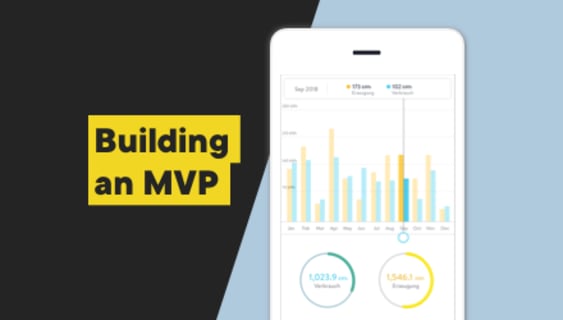Saving resources for a media company with an MVP app and Tableau implementation
In this case study, you will see how we helped an international media company improve their training process. With an MVP application and Tableau implementation, they’re saving approximately €70,000 monthly in terms of people capacity. With a suitable digital solution, training administration became much more sustainable, consuming less time and other resources. Read on to discover the details.

Table of contents
We co-created this case study with our partner, M2, a pioneer in NextGen Business Intelligence and the first and most experienced Tableau consulting partner in Germany. M2 empowers companies to leverage their data to make relevant business decisions faster and design new solutions with cutting-edge technology. Boldare was responsible for developing the app and M2 for embedding the Tableau implementation.
Tableau is a visual analytics platform that helps to aggregate and present data in an easy to understand manner.
The client
Our client was a European media company that has several thousand employees. It owns multiple newspapers and magazines and distributes various titles internationally, in both print and online versions.
Disclaimer: All the information relating to the client is protected by an NDA agreement, therefore we have avoided using data that could identify them. For the purpose of this case study, we’ll refer to them as ‘the company’.
Initial situation
In the context of the digitization of the media market, the company has faced major challenges in recent years. Production and communication processes have been digitized, and products have had to be adapted to new market requirements.
For the thousands of employees, this meant and still means that they have to undergo regular further training or professional reorientation. The company provides numerous courses, workshops, and retraining programs to ensure the digital expertise of all employees in the company.
The challenge
Training administration is based in the company’s central HR department. Here, around 400 courses and training sessions are planned, coordinated and delivered every year. This involves managing multiple tasks that are handled by just a few team members, i.e.:
- setting training dates,
- finding the right trainers,
- sending invitations,
- distributing training information to various departments,
- processing cancellations and changes; offering alternatives,
- managing training documentation,
- preparing and distributing certificates,
- sending materials to participants.
All of these activities are carried out by a team of five. This team was processing most of the work manually and under significant time pressure. It was all the “Training Organization” team’s job.
In the coordination between trainers, participants and organizers, discrepancies and unnecessary additional work occurred because the team was mostly working with outdated infrastructures and manually-oriented processes. This caused unnecessary stress and lowered levels of job satisfaction. The quality of the training also suffered as the team focused on logistics instead of developing quality training and taking current trends into account.
Requirements and goals
The head of the team, Monica, realized that something had to change. She wanted to automate manual processes to a large extent in order to reduce the number of errors and lower the potential stress for her team. Monica was sure some tasks - for example, training registrations, sending out registration confirmations, checking course workloads, and changing course participants - could be automated.
The main business goal: to change the staff focus required to organize training operations and create capacity for the team so that team members can work primarily on training content and quality instead of schedule coordination and training organization.
The solution
Boldare joined forces with M2 to develop a solution to reduce the effort of organizing company training. The app is called “ProCoach”.

The goal of introducing such an application is to organize the entire organization and its communication process via standardized forms, automated e-mail communication, and real-time analyses.
All course offers should be presented to the training participants via an intuitive interface where corresponding parameters can be selected: course, time, language, location, and other relevant information. Participants should be able to see automatically which courses are still available. Once they have registered, they will receive a confirmation email and will be reminded several times in the run-up to the course. After the course, participants can provide feedback and receive relevant documents or certificates of attendance.
The training organizers should be able to see, via dashboards, what the progress of each respective course is, including any schedule changes and cancellations, any complaints, and how the individual trainers are rated by the course participants. They shouldn’t have to do any intensive research for this - the data should come directly from the app.

We started the development with a product discovery process - a series of face to face meetings with all involved parties, including M2 as an important partner. The goal was to kick off the collaboration and most importantly, to understand the business problems of the company. The product discovery process involved multiple interviews conducted with company employees and stakeholders to map the pain points described above.
The app development team consisted of:
- 1 front-end developer
- 2 back-end developers
- A product designer
- A a scrum master
- A DevOps engineer for the first and the last sprint
The team, as with all Boldare teams, was working in Scrum.
We decided on the technical side of the product, target persons, potential integrations, and finally the first backlog and its prioritization. The results of this research were later transformed into a product roadmap that helped to prioritize the work and provide visibility for the stakeholders.

We decided to create ProCoach as an MVP product that would help us to validate the hypothesis that came from the main business problems: that creating a tool would help the company’s employees to release some of their capacity and focus on the quality of the training content, rather than on the process itself.
The main hypothesis we wanted to validate was concluded in the business goal: ‘by creating an MVP app we will significantly reduce the time that staff need to spend on training organization, and by this we will create more capacity for the team members to improve the content and quality of the training programs’.

The technical stack involved React on the front end, Contentful CMS that we used to upload tutorial content, and NestJS and PostgresQL for the back end. We used Tableau solutions that were implemented with the help of our partners from M2, and they were committed to the technical and design side of the product. Thanks to their help with the custom Tableau implementation, our development team could focus almost solely on delivering the MVP app.
During the entire process we were in touch with the user group that we set up at the beginning of the collaboration. In this case, it included the company’s employees. We were systematically seeking their feedback regarding each iteration we delivered to make sure the improvements were bringing real value to the users.
Development lasted for six weeks. After the release, we appointed a product strategist to help the company with clarifying the next steps for the product, and help stakeholders with making further decisions regarding its development.
M2’s involvement
The M2 team was responsible for the Tableau implementation for the app. The process started with gathering information regarding the status of the data, its structure, and possible permission levels.
The team made sure that the data would be easily accessible by users via the app. The security of the data was an important factor. Then, the implementation was designed and embedded into the software.
The M2 team used the following stack to design, create and implement solutions to the “ProCoach” app: Snowflake Data Cloud, AWS Cloud, ETL process for data modeling, and Alteryx.

Results: the ProCoach training app in use
Today, the ProCoach has been actively in use by the company’s employees for three months.
The previously manual and error-prone processes are now handled to a large extent via the ProCoach app. Most requests from participants are fielded via ready-made registration forms, stored information and appointment calendars. Using the collected data, the team also has the opportunity to evaluate the performance of the trainers, the utilization of the courses, and the failure rates of the participants. Via an online-based, standardized reporting system, this information is available at any time.
The participants
For training participants, it is clear how and where they can register for their training. The interface of the ProCoach app provides them with all the necessary information and a high degree of flexibility. For example, if they have registered for a course that they later find they cannot attend, they can simply cancel their participation via the app interface and select a new date.
They are automatically reminded when the course is taking place, what they need to bring to the course, and what prior knowledge they require. They can also evaluate the course and trainer quickly and easily after the training.
The training program
The training team now has more time for content-related and quality issues. In addition, there is no more need for hiring new personnel, so costs have been saved.
The entire training operation functions in a more standardized, structured, reliable and faster way. Both training participants and training organizers benefit from having the processes automated and carried out digitally by ProCoach.
Conclusion
Today the ProCoach app helps to reduce the time and costs of managing training and development activities. It makes it possible to significantly streamline time-consuming, manual processes with high personnel requirements.
The app helped to save €70,000 monthly in capacity terms, which is the equivalent of approximately 2 FTE of human resources specialists. The capacity of two team members released in this way was re-focused on training quality.
If you want to take the opportunity to get to know Boldare and M2 via a personal, free consultation appointment, let us know. We look forward to facing your challenge with our solutions.
Share this article:











